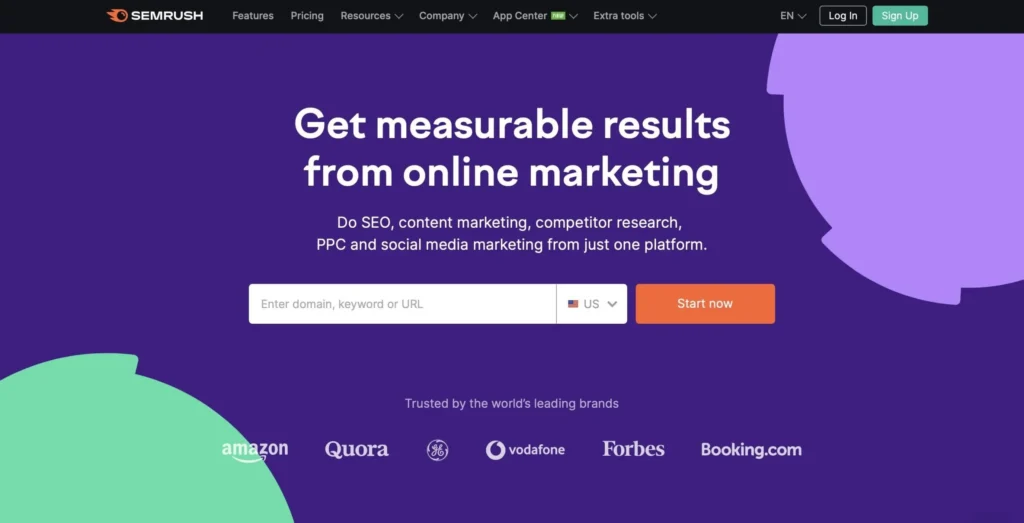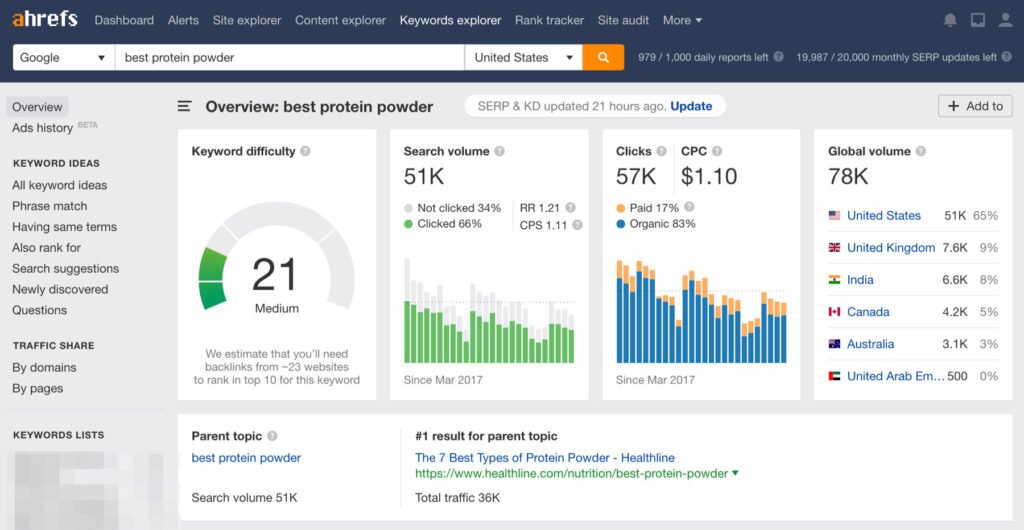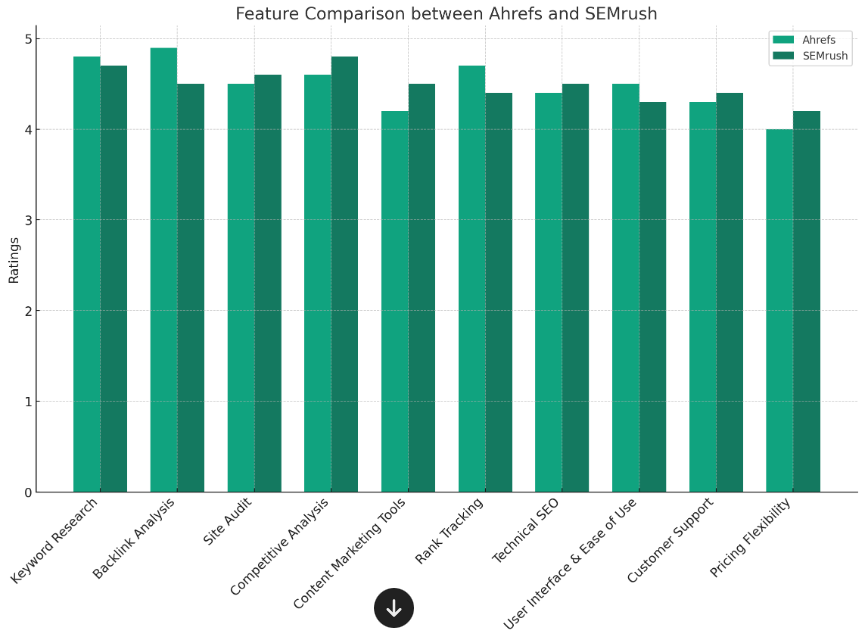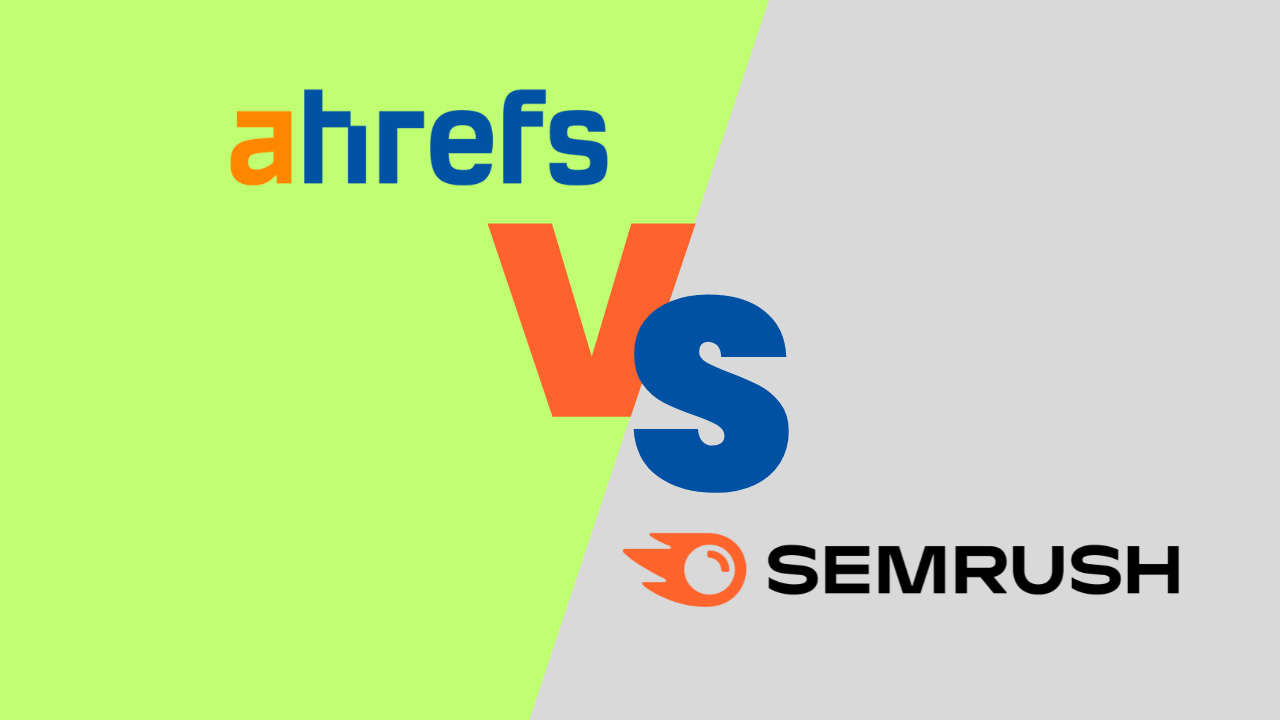In this comprehensive SEMrush vs Ahrefs comparison, we’ll dive deep into the features and capabilities of both tools. From keyword research and backlink analysis to site audits and competitive analysis, this blog explores how SEMrush and Ahrefs stack up in the essential aspects of SEO and digital marketing.
Table of Contents
SEMrush: A Comprehensive Digital Marketing Suite

SEMrush tends to be the more comprehensive digital marketing tool, making it a potentially better choice for users who need an all-in-one platform. It excels in areas such as competitive analysis, content marketing tools, and customer support.
- Competitive and Market Analysis: SEMrush offers extensive tools for competitive intelligence, including Traffic Analytics and Market Explorer. These tools allow for a deep dive into competitors’ strategies, market trends, and audience segmentation, which is invaluable for businesses operating in competitive niches or those heavily reliant on strategic insights for growth.
- Content Marketing: The Content Marketing Toolkit in SEMrush is robust, providing features from topic research to content optimization and performance tracking. For organizations with a strong focus on content as a key marketing strategy, SEMrush offers more specialized tools to support content creation, optimization, and analysis.
- Customer Support: SEMrush is known for its responsive customer support and extensive educational resources, including a large knowledge base, webinars, and active community forums. This can be particularly beneficial for businesses that require frequent support or those looking to expand their knowledge in SEO and digital marketing.
Ahrefs: Specialized in SEO and Backlink Analysis

Ahrefs, on the other hand, is often celebrated for its superior backlink analysis tools and user-friendly interface, making it an excellent choice for users primarily focused on SEO, particularly backlink strategies.
- Backlink Analysis: Ahrefs boasts one of the largest backlink databases, providing detailed insights into backlinks, referring domains, and the quality of these backlinks. For SEO professionals and agencies whose primary focus is on building and monitoring backlink profiles, Ahrefs might offer a slight edge.
- User Interface and Ease of Use: With its clean and intuitive interface, Ahrefs is particularly user-friendly, making it a great option for beginners or those who prefer simplicity in navigating through extensive data and features.
Decision Factors
The decision between Ahrefs and SEMrush should also consider the following factors:
- Pricing Flexibility: SEMrush offers a limited free plan and a variety of pricing options, making it more accessible to individuals, small businesses, or those just starting with SEO and digital marketing. Ahrefs, while offering a trial, generally requires a subscription, which might be a consideration for budget-conscious users.
- Specific Needs and Goals: Your specific digital marketing needs and goals play a crucial role in determining the best tool. For instance, if backlink analysis is your primary need, Ahrefs might be the better choice. Conversely, if your strategy is heavily reliant on competitive intelligence and content marketing, SEMrush could be more suitable.
- Learning Curve and Resource Availability: Consider your team’s capacity to learn and utilize the features of these tools. Ahrefs might be more suitable for teams looking for ease of use and straightforward functionality, while SEMrush could be a better fit for teams that can invest time in mastering a more comprehensive suite of tools.
Features Comparison Table
| Feature | Ahrefs | SEMrush | Comparative Insight |
|---|---|---|---|
| Keyword Research | Known for detailed competitive intelligence, including traffic analytics, market exploring, and advertising strategies. | Comprehensive database with search volume, keyword difficulty, variations, and intent data. Strong in providing related questions. | Both are strong, but SEMrush may offer more in terms of keyword intent and related questions. |
| Backlink Analysis | Known for a vast backlink database and detailed insights into backlink profiles, including new/lost backlinks and referring domains. | Offers comprehensive backlink analysis with auditing features, harmful link identification, and backlink types distribution. | Ahrefs is often preferred for its extensive backlink database, though SEMrush provides strong auditing capabilities. |
| Site Audit | Provides a robust site audit tool with a health score, identifies SEO issues, and offers detailed recommendations. | Conducts a thorough site audit checking over 130 SEO issues with detailed reports and actionable insights. | Both tools are strong, with SEMrush possibly offering a more in-depth analysis. |
| Competitive Analysis | Offers insights into competitors’ search strategies, top pages, and content gaps, particularly strong in backlink strategy analysis. | Known for detailed competitive intelligence, including traffic analytics, market explorer, and advertising strategies. | SEMrush might have the edge in competitive analysis with its broader set of competitive intelligence tools. |
| Content Marketing Tools | Features a Content Explorer for finding popular content by topic or keyword and a Rank Tracker. | Provides a comprehensive Content Marketing Toolkit, including content audit, topic research, and SEO content template. | SEMrush provides a more extensive set of content marketing tools, making it preferable for content-focused users. |
| Rank Tracking | Offers a Rank Tracker tool that is intuitive and provides detailed ranking data over time. | Also provides rank tracking capabilities with competitive positioning and SERP features tracking. | Both tools offer strong rank tracking capabilities, with preferences depending on user interface and additional data needs. |
| Technical SEO | Strong in identifying a wide range of technical SEO issues with actionable recommendations. | Extensive site audit capabilities that cover a broad spectrum of technical SEO issues and detailed insights. | SEMrush might offer a slight edge in technical SEO due to its comprehensive audit features. |
| User Interface & Ease of Use | Known for its clean, intuitive interface that is easy to navigate, making it user-friendly, especially for beginners. | Offers a detailed and comprehensive interface that might have a steeper learning curve, but provides extensive data and customization. | Ahrefs is often praised for its user-friendly interface, making it more accessible to beginners. |
| Customer Support | Provides support through various channels but is sometimes noted for slower response times. | Known for a responsive support team, extensive knowledge base, and active community forums. | SEMrush might offer superior customer support with its more responsive service and extensive educational resources. |
| Pricing Flexibility | Offers multiple pricing tiers from basic to advanced, with no free version. Trial available for a nominal fee. | Provides several pricing plans suitable for different needs, including a limited free version and trial periods for advanced plans. | SEMrush offers more flexibility with its free version and varied pricing plans, catering to a wider range of users. |
When comparing SEMrush vs Ahrefs, it’s crucial to delve into the core functionalities that each offers. This comparison between SEMrush and Ahrefs will focus on keyword research, backlink analysis, site audits, competitive analysis, content marketing tools, rank tracking, technical SEO, user interface and ease of use, customer support, and pricing flexibility. Our objective is to see how SEMrush vs Ahrefs stack up in these critical areas, providing insights into which tool might be more suited to your needs.
Keyword Research in SEMrush vs Ahrefs
In the SEMrush vs Ahrefs debate, keyword research is a pivotal feature. SEMrush offers an extensive keyword database, making it a favorite for many SEO professionals. Ahrefs counters with its Keywords Explorer, providing detailed keyword data. Between SEMrush and Ahrefs, both tools excel in keyword research, offering deep insights into search volumes, keyword difficulty, and SERP analysis.
Backlink Analysis: SEMrush vs Ahrefs
Backlink analysis is another arena where SEMrush vs Ahrefs are closely matched. Ahrefs boasts one of the most comprehensive backlink databases, making it a go-to for backlink analysis. SEMrush, on the other hand, offers a robust backlink audit tool, crucial for identifying harmful backlinks. When comparing SEMrush vs Ahrefs for backlink analysis, both tools provide exceptional capabilities.
Site Audit Capabilities: SEMrush vs Ahrefs
Site audits are essential for SEO health. SEMrush’s site audit tool is incredibly thorough, checking for a wide range of SEO issues. Ahrefs offers a similarly powerful site audit feature, with an intuitive interface. In SEMrush vs Ahrefs for site audits, both tools are highly competent, offering detailed insights and actionable recommendations.
Competitive Analysis with SEMrush vs Ahrefs
Competitive analysis is where SEMrush often takes the lead in the SEMrush vs Ahrefs comparison. SEMrush’s suite of competitive intelligence tools is comprehensive, providing deep insights into competitors’ strategies. Ahrefs also offers competitive analysis features, but SEMrush is particularly renowned in this area.
Content Marketing Tools: SEMrush vs Ahrefs
In the realm of content marketing, SEMrush vs Ahrefs both offer valuable tools. SEMrush’s Content Marketing Toolkit is extensive, aiding in every step of the content lifecycle. Ahrefs’ Content Explorer is great for uncovering popular content and identifying content gaps. SEMrush vs Ahrefs in content marketing tools shows both platforms’ commitment to supporting content strategy.
Rank Tracking in SEMrush vs Ahrefs
Rank tracking is crucial for monitoring SEO success. SEMrush provides detailed rank-tracking features, including daily updates and competitive positioning. Ahrefs’ Rank Tracker is also robust, offering precise tracking capabilities. SEMrush vs Ahrefs in rank tracking demonstrates both tools’ effectiveness in monitoring keyword rankings.
Technical SEO: SEMrush vs Ahrefs
Technical SEO is another critical feature in the SEMrush vs Ahrefs comparison. SEMrush’s site audit tool covers a wide array of technical SEO aspects. Ahrefs, with its site audit feature, also ensures your site is optimized for search engines. SEMrush vs Ahrefs in technical SEO shows both platforms offer strong tools to address SEO issues.
User Interface and Ease of Use: SEMrush vs Ahrefs
The user interface is where many users make their choice between SEMrush vs Ahrefs. Ahrefs is known for its user-friendly interface, appealing to a broad user base. SEMrush, with its comprehensive dashboard, offers extensive functionalities at the cost of a steeper learning curve. In SEMrush vs Ahrefs for user interface and ease of use, personal preference plays a significant role.
Customer Support: SEMrush vs Ahrefs
Customer support is vital for any SEO tool. SEMrush is known for its responsive customer support and extensive educational resources. Ahrefs also provides solid customer support, ensuring users have the help they need. When comparing SEMrush vs Ahrefs for customer support, both platforms are committed to assisting their users.
Pricing Flexibility: SEMrush vs Ahrefs
Pricing is a crucial consideration in the SEMrush vs Ahrefs comparison. SEMrush offers a free plan and multiple pricing tiers, providing flexibility for users. Ahrefs, while lacking a free plan, offers a range of pricing options suitable for various needs. In SEMrush vs Ahrefs for pricing flexibility, SEMrush offers a slight edge with its free tier.
In conclusion, the SEMrush vs Ahrefs comparison highlights the strengths and unique offerings of each tool. Whether it’s SEMrush with its competitive intelligence and content marketing tools or Ahrefs with its backlink analysis and user-friendly interface, both SEMrush and Ahrefs offer exceptional features for SEO and digital marketing. The choice between SEMrush and Ahrefs will ultimately depend on your specific needs, budget, and personal preferences.
Graphs (SEMrush vs Ahrefs)
Given the qualitative nature of most feature comparisons, the graphs will represent feature availability or a generalized performance rating on a scale (for instance, from 1 to 5, where 1 might mean ‘Poor’ and 5 ‘Excellent’). These ratings will be hypothetical and intended to provide a visual representation of how one might compare the tools across different features.
Features to Compare:
- Keyword Research
- Backlink Analysis
- Site Audit
- Competitive Analysis
- Content Marketing Tools
- Rank Tracking
- Technical SEO
- User Interface & Ease of Use
- Customer Support
- Pricing Flexibility
Let’s create the graphs for these features:

The graph above provides a hypothetical comparison of Ahrefs and SEMrush across 10 distinct features, with ratings on a scale of 1 to 5. These ratings are meant to represent a generalized performance or availability level for each feature within each tool.
Key observations from this hypothetical data might include:
- Backlink Analysis: Ahrefs has a slight edge in backlink analysis, reflecting its reputation for having a comprehensive backlink database.
- Competitive Analysis: SEMrush scores slightly higher in competitive analysis, which aligns with its strong suite of tools for market and competitor research.
- Content Marketing Tools: SEMrush has a slightly higher rating, possibly due to its broader set of tools tailored for content marketing, including content audit and content idea generation features.
- Technical SEO: Both tools show strong capabilities in technical SEO, with SEMrush having a marginal advantage, which might reflect its detailed site audit and technical SEO features.
- Pricing Flexibility: Ahrefs has a slightly lower rating, which could reflect its more straightforward pricing structure without a free tier, compared to SEMrush which offers a limited free version.
Please remember, that these ratings are hypothetical and intended for illustrative purposes. Actual performance and satisfaction with these features can vary based on personal or organizational needs, and the specifics of each tool’s capabilities and updates. Always consider conducting your research, including taking advantage of trial periods, to assess which tool best meets your requirements.
To provide a star rating comparison between Ahrefs and SEMrush across various features, let’s use a scale of 1 to 5 stars, where 1 star indicates poor performance and 5 stars indicates excellent performance. These ratings are based on the detailed analysis provided earlier and are intended to give a quick visual representation of each tool’s strengths and capabilities across different categories.
Star Ratings Features Comparison
| Feature | Ahrefs | SEMrush |
|---|---|---|
| Keyword Research | ★★★★★ | ★★★★★ |
| Backlink Analysis | ★★★★★ | ★★★★☆ |
| Site Audit | ★★★★☆ | ★★★★★ |
| Competitive Analysis | ★★★★☆ | ★★★★★ |
| Content Marketing Tools | ★★★★☆ | ★★★★★ |
| Rank Tracking | ★★★★★ | ★★★★☆ |
| Technical SEO | ★★★★☆ | ★★★★★ |
| User Interface & Ease of Use | ★★★★★ | ★★★★☆ |
| Customer Support | ★★★★☆ | ★★★★★ |
| Pricing Flexibility | ★★★★☆ | ★★★★★ |
Analysis:
- Keyword Research: Both tools excel in keyword research, offering extensive databases and useful insights, thus both receive a 5-star rating.
- Backlink Analysis: Ahrefs is often preferred for its comprehensive backlink data, earning it a 5-star rating, while SEMrush is also strong but slightly behind, with a 4.5-star rating.
- Site Audit: SEMrush’s detailed and thorough site audit capabilities give it a slight edge with a 5-star rating, compared to Ahrefs’ 4.5 stars.
- Competitive Analysis and Content Marketing Tools: SEMrush shines in these areas, offering extensive tools and data, meriting a 5-star rating in both categories. Ahrefs remains strong but is slightly less comprehensive, earning 4.5 stars.
- Rank Tracking: Ahrefs gets a 5-star rating for its intuitive and detailed rank tracking, while SEMrush, although robust, receives a 4.5-star rating.
- Technical SEO: SEMrush’s extensive site audit and technical SEO capabilities earn it 5 stars, with Ahrefs slightly behind at 4.5 stars.
- User Interface & Ease of Use: Ahrefs is known for its user-friendly interface, earning it 5 stars, whereas SEMrush, with a more complex interface due to its extensive features, receives 4.5 stars.
- Customer Support: SEMrush’s responsive support and extensive educational resources give it a 5-star rating, with Ahrefs slightly behind at 4.5 stars due to variability in support experiences.
- Pricing Flexibility: SEMrush offers a free plan and a wider range of pricing options, earning it 5 stars. Ahrefs, without a free plan and with a slightly less flexible pricing structure, receives a 4.5-star rating.
These ratings are a simplified representation based on a detailed analysis and can vary based on individual user experiences, updates to the tools, and specific use cases.
Overall Star Ratings:
- SEMrush: ★★★★☆
- Ahrefs: ★★★★☆
Rationale:
- SEMrush is awarded 4.5 stars due to its comprehensive features that cover a wide range of digital marketing needs, its slightly better performance in competitive analysis, content marketing, and technical SEO, as well as its superior customer support and pricing flexibility.
- Ahrefs also receives 4.5 stars, reflecting its strength in backlink analysis, its highly user-friendly interface, and its robust performance in keyword research and rank tracking. It’s slightly less comprehensive in some areas compared to SEMrush but is still an exceptionally powerful tool for SEO.
Conclusion:
Both SEMrush and Ahrefs are highly capable and offer a broad array of features that cater to various SEO and digital marketing needs. The choice between the two should be based on which features are most important to you, your specific use cases, and personal preferences. The half-star difference in the overall rating does not imply a significant advantage of one tool over the other but rather highlights SEMrush’s broader feature set and flexibility, which may cater to a wider audience.
These ratings are generalized and might not apply to every user’s specific needs. It’s recommended to consider the detailed feature comparison and your priorities in SEO and digital marketing when choosing the tool that’s best for you.




